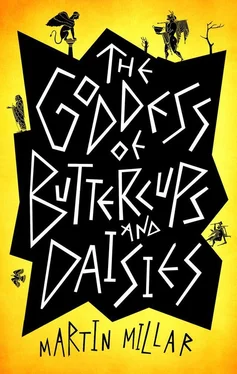‘Everyone else is sick of you, you and your vile, unpatriotic, insulting plays. I’m warning you, Aristophanes, if you keep harping on about peace there’s going to be trouble. What’s your new play called?’
‘ Peace .’
‘Then I predict trouble.’
Socrates usually exercised in the morning. At forty-nine, he was still a strong man. He’d grown up as a stonemason, helping his father hew rocks, and since then he’d never neglected his health. He left the Lyceum with friends, Menexenus and others. Not teaching, though talking, as always, of philosophy.
‘I just don’t understand this,’ said young Menexenus. ‘You say knowledge is contained inside people? And learning is merely a process of remembering? I can’t see that at all.’
Socrates nodded as they passed beyond the boundary of the Lyceum. He was fond of young Menexenus, an Athenian of good character. They paused under the three olive trees, a familiar landmark.
‘I could demonstrate my meaning, if someone with little knowledge appeared,’ said Socrates.
Abruptly there was a dull thud, followed by a cry of pain. The philosopher and his followers looked round to see a figure sprawled in the dirt, comically spreadeagled, face down.
‘It’s young Luxos,’ said Menexenus. ‘He’s fallen over that small twig.’
‘Perfect,’ said Socrates. ‘Luxos, would you care to help me with a demonstration?’
A young woman in an unusually short dress was bending over Luxos, soothing his hurt and helping him to his feet. The young poet clambered upright, embarrassed at his display of clumsiness so close to the training grounds. Luxos generally avoided the city’s gymnasiums, not being very good at any sort of physical activity.
‘Not right now, Socrates,’ he said. ‘We’ve come to you for advice.’
There was a general lack of interest in this from the group, though Socrates paid polite attention.
‘We thought you might be able to help,’ said the girl, and smiled.
Socrates nodded. ‘Does Luxos want to know how to get his poetry heard by the Greek masses?’
‘Oh,’ said the girl, and looked impressed. ‘You really are wise.’
‘The subject has come up before.’ Socrates smiled.
Nearby there was the sound of discuses landing, thrown by athletes in the Lyceum. Metris, rather cleverly, had by now manoeuvred them a few paces back from Socrates’ companions, where they could talk without being overheard.
‘I don’t think I can help you,’ said Socrates. ‘I would if I could, but I can’t see any way for you to attract a rich sponsor.’
‘Are you going to Callias’s symposium tonight?’ asked Luxos.
‘I am… rather unwillingly…’
‘Could you get me in?’
Socrates pursed his lips. ‘Callias is not that enlightened when it comes to inviting penniless poets to his drinking parties.’
Luxos was immediately disheartened. ‘It’s so unfair.’
The philosopher turned to Metris. He noticed the small flute she wore on a string around her neck.
‘Can you play that flute well?’
‘I can.’
Socrates lowered his voice to a whisper. ‘Well, you could sneak in the servants’ door at the back and pretend to be the entertainment.’
Luxos’s face lit up. ‘That’s a brilliant idea! Once I’m in there I’m bound to get a chance to recite some poetry. I’ll get a sponsor in no time. Thanks, Socrates!’
Socrates nodded. ‘Don’t tell anyone I suggested it,’ he whispered, then went on his way.
Hyperbolus, as a strong supporter of Athens’ democratic faction, could not enter the Pegasus barber shop, where Euphranor the weapon-maker conducted most of his business. Similarly, Euphranor, a conservative, would not have been welcomed in the back room of the tavern on the edge of Piraeus where the important democrats met to discuss their affairs. So they met on top of the acropolis, outside the Parthenon, where anyone might be. For a place to hide in plain sight, it was ideal. The Parthenon was renowned as one of the finest buildings in the world. Everyone met there at some time, even political enemies. There was nothing suspicious about them exchanging a few words.
Neither liked the other. In past times, Hyperbolus had castigated Euphranor in front of the whole assembly, accusing him of exploiting the workers who toiled in his armoury, and using his wealth to bribe politicians. For his part, Euphranor had bribed politicians to lay into Hyperbolus, blackening his name, spreading rumours about him and paying people to vote against him. Now they were allies, supporting the same cause. They both wanted the war to continue. It suited them to put aside their differences for a while.
‘I don’t like the way things are going,’ said Hyperbolus. ‘It was a step forward when the peace conference broke up, but there’s still a lot of pressure to end the war. I particularly don’t like the way everyone is talking about Aristophanes’ play. You know it’s called Peace ?’
‘It’s just a play,’ said Euphranor. ‘Is it that important?’
‘Who knows? It might be the thing that tips the balance.’
‘Antimachus is his choregos. He assured us he’d sabotage it. He hasn’t been giving Aristophanes any money.’
Hyperbolus frowned. ‘I know. But Aristophanes isn’t giving up. What if he gets funds from somewhere else?’
‘I don’t suppose there’s much we can do about it. The plays at the Dionysia are sacred, even Aristophanes’ obscene comedies. We can’t be seen to be interfering with it. We’ll just have to trust Antimachus to ruin it.’
‘I suppose so.’ Hyperbolus would like to have taken stronger action, but he knew Euphranor was right. The Dionysia was sacred. It wouldn’t do to be caught interfering with it. Charges of impiety could follow. Athens was full of informers. You never quite knew who you could trust. They walked on under the gaze of Hephaistos and Hera, god and goddess, carved on the east pediment of the great temple. There they stood for a moment, discussing other matters, but fell silent as an unfamiliar woman walked by. Tall and dark. Beautiful, though strangely dressed. Certainly not a native of the city. Moments after she’d gone, Hyperbolus turned to Euphranor.
‘You know, why take chances? Why don’t we just kill Aristophanes and get it over with?’
Euphranor’s eyes opened wide. ‘Kill Aristophanes? That’s a brilliant idea. Why didn’t we think of it before?’
‘We could hire someone to do it tonight.’
On the steps of the Parthenon, Laet halted and looked back at the two plotting politicians. She smiled to herself.
It never takes much.
She went inside the temple to look at the frieze which, she had heard, was one of the finest works of art in the city.
Luxos and Metris watched as two slaves carrying amphoras of wine entered Callias’s house via the alleyway at the back.
‘I’ve never seen such a big house,’ said Metris.
‘Richest man in Athens, so they say.’
Another wagon-load of supplies trundled past. Seeing the size of the house, the stream of luxury goods being carried inside, and the number of slaves and servants in attendance, Luxos and Metris took a step back, temporarily intimidated.
‘Don’t worry,’ said Luxos.
Wisdom outweighs any wealth — Sophocles
‘We can outwit them.’ He marched confidently along the alley, his lyre in his hand. ‘The party will be full of influential people and I’m going to give them some poetry they’ll never forget.’
The door at the back was opened by a servant, a woman well-versed in keeping out freeloaders. Her face set grimly at the sight of Luxos and Metris, as likely a pair of freeloaders as she’d seen for some time.
Читать дальше












